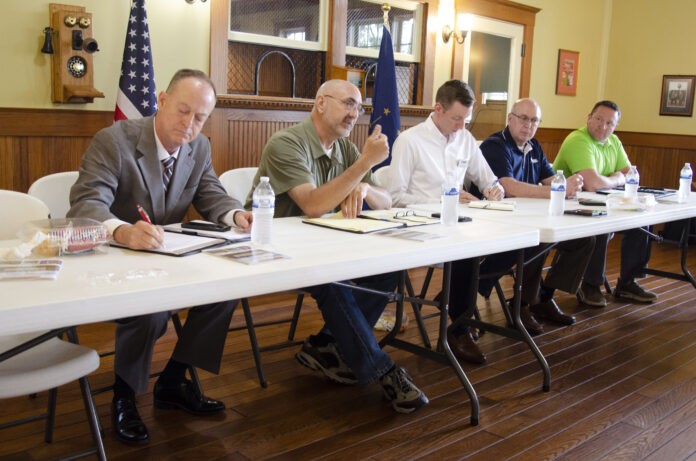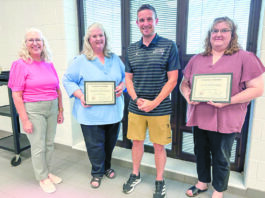By Don Steen
Staff Writer n reporter@psci.net
The Jasper Chamber of Commerce hosted State Representatives Steve Bartels and Shane Lindauer as well as State Senator for District 48 and GOP candidate for the Eighth Congressional District Mark Messmer to the Jasper Train Depot Thursday morning for a legislative roundtable. The officials fielded a number of questions from local leaders in the public and private sectors, and detailed some likely action items on the horizon for the state government. Topics ranged from marijuana policy and tax policy to more personal priorities based on each representative’s constituency.
Lindauer, representing the 63rd State District, said property taxes would be a be a big issue in the next legislative session. This is one topic that consistently arises in meetings with constituents, and his colleagues also have the matter in their crosshairs.
“I’ve heard a lot of talk about it,” said Lindauer.
The topic of property taxes would be discussed in greater depth later in the meeting.
Lindauer also stated that his personal priorities currently lay in regulatory matters and conservation initiatives. Specifically, he said he would like to see Indiana’s conservation efforts streamlined with a regular budget, as opposed to having their finances vary from session to session.
Messmer touched on another issue that would become a recurring topic of discussion throughout the lunch meeting, marijuana policy. With the federal government likely to reschedule the drug, while not outright legalizing it, he expected there would be some pressure on Indiana to change its enforcement policy in the near future.
Illinois, Michigan, and Ohio have all legalized recreational marijuana, although the particulars vary greatly from state to state. Kentucky will be launching a legal medical marijuana program on the first of next year, though it will continue to enforce state and federal bans on recreational use or possession.
Whether Indiana follows the western, northern, and eastern neighbors, follows Kentucky in legalizing medical use only, or stands as a regional holdout in denying legal status altogether, Messmer sees the marijuana matter coming to a head soon.
For his part, Messmer said the experience of legalization in various states has shown mixed results, with promises of tax revenue from sales often falling short of more optimistic hopes. He also pointed out that legal marijuana dispensaries do not necessarily crowd out illicit dealers, as black markets tend to crop up offering competing strains of the drug.
Messmer said that rather than relieving police officers of enforcement duties against marijuana, their job just gets more complex sorting out which drugs are legal within the state and which are not.
“Law enforcement’s job just changes,” he said.
Messmer also expressed concern that there is no standard definition of “intoxication” for a marijuana user even in states where it is legal. There is no direct equivalent of blood-alcohol-content testing to determine a point at which a person can no longer safely operate a vehicle, or at least not one that holds true from state to state. This also causes confusion for employers, as THC levels can remain elevated for quite some time, making it difficult to prove whether an employee is fit for work at any given time even if they haven’t partaken recently.
“There’s a lot of things to work through,” he said.
Read more on this story in the Ferdinand News and Spencer County Leader!




